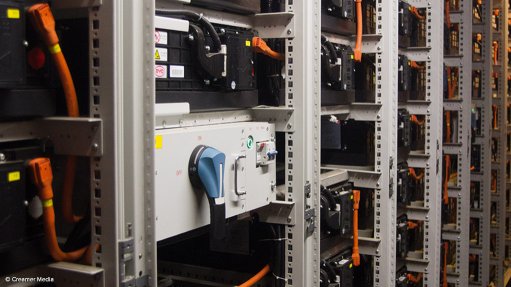
Photo by: Creamer Media
State-owned electricity producer Eskom says it is in the final stages of pre-contract discussions for the first phase of its much-anticipated battery energy storage system (BESS) deployment, which will involve investments valued at about R5-billion.
During Phase 1, the utility aims to introduce 199 MW/832 MWh of BESS capacity across eight sites, including:
- 80 MW at Skaapvlei, 20 MW at Hex, 9.5 MW at Paleisheuwel and 5 MW at Graafwater, all in the Western Cape;
- 35 MW at Melkhout, in the Eastern Cape;
- 40 MW at Pongola and 8 MW at Elandskop, in KwaZulu-Natal; and
- 1.54 MW plus 2.04 MW of solar photovoltaic at Rietfontein, in the Northern Cape.
Eskom tells Engineering News that the sites were chosen to maximise the benefits of BESS on the local and national networks as well as to optimise renewables integration.
“The primary use will be for national peak shaving purposes for four hours a day, [while] the secondary use case will be for ancillary services and local network support,” Eskom said in response to questions.
Earlier this year, CEO Andre de Ruyter indicated that he had been impressed by the quality of the bids for Phase 1 and said he looked forward to the BESS projects being integrated into the network to help strengthen the grid and to help the utility manage “peaks and troughs”.
De Ruyter was in Washington DC this week where he had meetings with the World Bank, one of the funders of the BESS project.
Eskom tells Engineering News that Phase 1 is being funded by the Clean Technology Fund with the World Bank as the implementing entity, the Clean Technology Fund with the African Development Bank as implementing entity, as well as by the Brics bloc’s New Development Bank.
The South African utility will fully own the assets, but there will be a fixed operating and maintenance period of five years with the successful vendors after the start of commercial operation.
The project execution periods vary from seven to 12 months, Eskom reports.
The roll-out forms part of a larger 360 MW/1 440 MWh deployment, which will see Eskom invest some R11-billion in BESS, largely as a replacement for the 100 MW Kiwano concentrated solar power project initially included, but later abandoned, as part of the $3.75-billion World Bank loan of 2010.
The utility could not be drawn on when the project will begin, saying only that deployment would follow on from the award of the contracts and was also subject to the receipt of a licence from the National Energy Regulator of South Africa (Nersa).
The projects have been included in Eskom’s fifth multiyear price determination revenue application as capital expenditure, “in accordance with the expected concurrence of Nersa of the Integrated Resource Plan determination”.
The costs associated with operationalisation have not yet been included in its revenue application, however.
On whether there is sufficient energy available in load-shedding-prone South Africa to charge the batteries, Eskom said that charging would be conducted during off-peak periods, or when the network conditions permit.